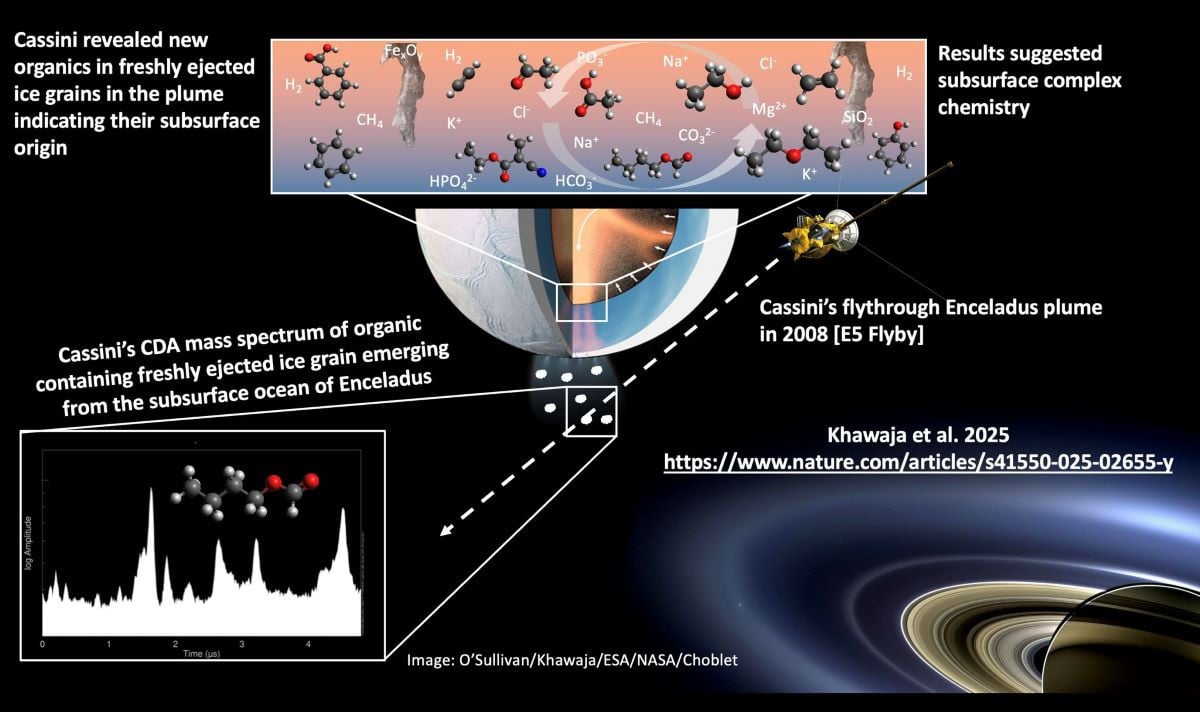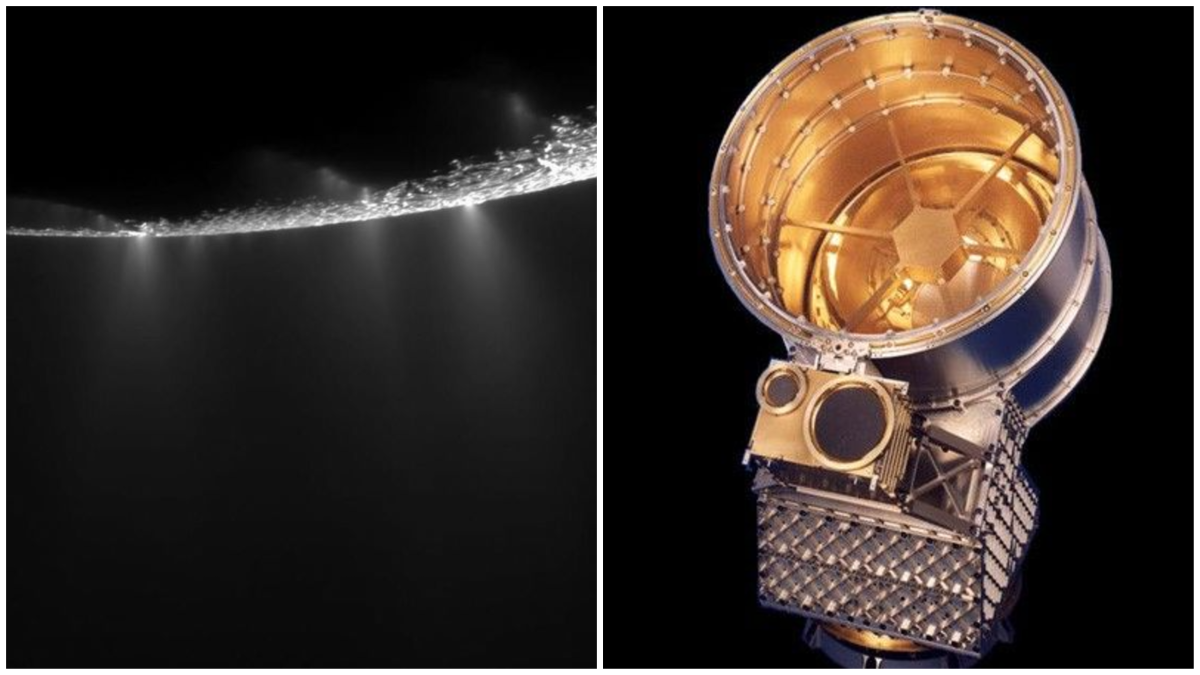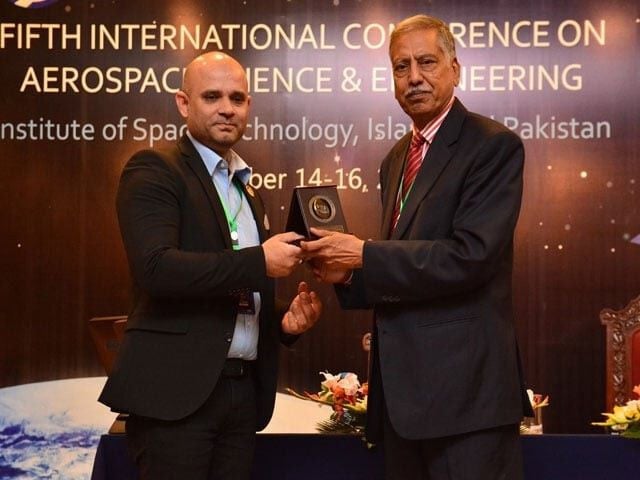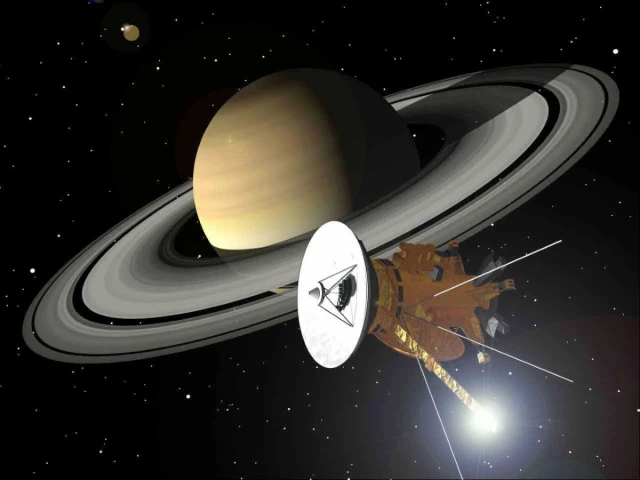A Pakistan-born German scientist has discovered new life-supporting molecules in the ocean beneath the icy shell of Enceladus, a moon that revolves around Saturn – the jewel planet of our solar system.
Astrobiologist Dr Nozair Khawaja of Freie Universität Berlin in Germany, and lead author of the study, published a research paper on October 1 in Nature Astronomy.
His team painstakingly examined the vast data collected by NASA’s Cassini spacecraft and identified complex organic molecules in ice grains emitted from geyser-like jets at the moon’s ocean floor. A large number of snowflakes and gases, somehow released from the moon’s icy surface through cracks near its south pole, fly above the surface and even become part of its largest loop, called the E ring.
Speaking to The Express Tribune, Dr Khawaja said they found ethers, alkenes, and organic moieties in the new studies. “We have found several categories of organic – meaning primarily carbon-containing – molecules that span a range of structures and chemical properties. Some – esters and ethers – contain bridges of oxygen atoms and both single and double bonds in their structures. Some are aliphatic (meaning straight-chained) while others are cyclic in nature. Aromatic molecules (six-ringed carbon atoms that form a particularly robust chemical structure), alongside nitrogen- and oxygen-bearing molecules, were also detected,” he said.

An info graph showing details of the current research in search of organic compounds on Saturn’s Moon. PHOTO: Nozair Khawaja/Nature
A recipe for extra-terrestrial life
Khawaja said these molecules give us deeper insight into the possibilities of complex chemistry in the subsurface ocean of Enceladus. Such compounds are believed to be intermediates in the synthesis of more complex molecules, which could support the formation of potentially biological compounds, for example, pyrimidines.
“It is important to note, however, that these molecules can be formed abiotically, without any interaction with life,” he clarified.
Astrobiologists say that there are three major conditions needed for life anywhere in the cosmos: liquid water, an energy source, and chemicals (including organics and inorganics). Enceladus holds all these requirements, despite being a shiny body only 505 km across.

The collage shows the edge of Enceladus, displaying plumes of icy grains from the cracks (R) and Cosmic Dust Analyzer. PHOTO: NASA
How to catch the cosmic dust
The Cassini-Huygens probe left our blue planet in October 1997, traveled roughly 3.5 billion kilometers during its six years and eight months of travel, and reached Saturn in July 2004.
Equipped with the state-of-the-art Cosmic Dust Analyzer (CDA) – a bucket-shaped instrument with advanced sensors and spectrometers – it also detected phosphates, meaning five of the six life-supporting elements on Enceladus, known as CHNOPS (carbon, hydrogen, nitrogen, oxygen, phosphorus, and sulphur).
During a snow flurry, if you want to collect more ice particles in a glass, you have to move the glass in the direction of the wind — the Cassini probe did the same. Over 13 years around Saturn, it collected thousands of icy grains during its flybys of the planet’s E ring. The spectrometers detected molecules and sent the data back to us.
“One of the major aspects of this work is that the organics were sampled just minutes after their ejection from Enceladus and so could not have been affected by space radiation. We are confident that these molecules originate from the subsurface ocean of the moon, enhancing its habitability potential,” said Khawaja.
According to the researchers, Cassini tells us that water-rock interactions take place at the ocean floor, where hydrothermal vents exist, just like in our oceans on planet Earth. One such example is the microbial-rich Lost City Hydrothermal Field in the middle of the Atlantic Ocean.
“On Enceladus, we do not yet know whether life exists, whether it was present in the past but no longer exists, or if prebiotic chemistry is taking place. However, Enceladus is the prime target in contemporary space exploration to answer these questions, and our latest work will support and guide future mission planning to this moon of Saturn,” said Khawaja.

Dr Nozair Khawaja (L) receiving an award in Islamabad. PHOTO: EXPRESS
Dr Khawaja was born in Wazirabad, a city located in the Gujranwala district of Punjab. He completed his Master’s in Astronomy and Space Sciences from Punjab University.
Later, the Pakistani scientist acquired a PhD in Geosciences from Heidelberg University in Germany. He has also worked as a postdoctoral scholar at the Institute of Earth Sciences at the same German university. He has conducted comprehensive research on life beyond Earth and is a leading name in many research programmes.
In 2019, NASA honoured Dr Khawaja with the Group Achievement Award for Cassini’s Cosmic Dust Analyzer. He is also a recipient of the Horneck-Brack Award from the European Astrobiology Network Association in 2018. His work has appeared in highly cited peer-reviewed scientific journals such as Nature, Science, and the Journal of the Royal Astronomical Society.

